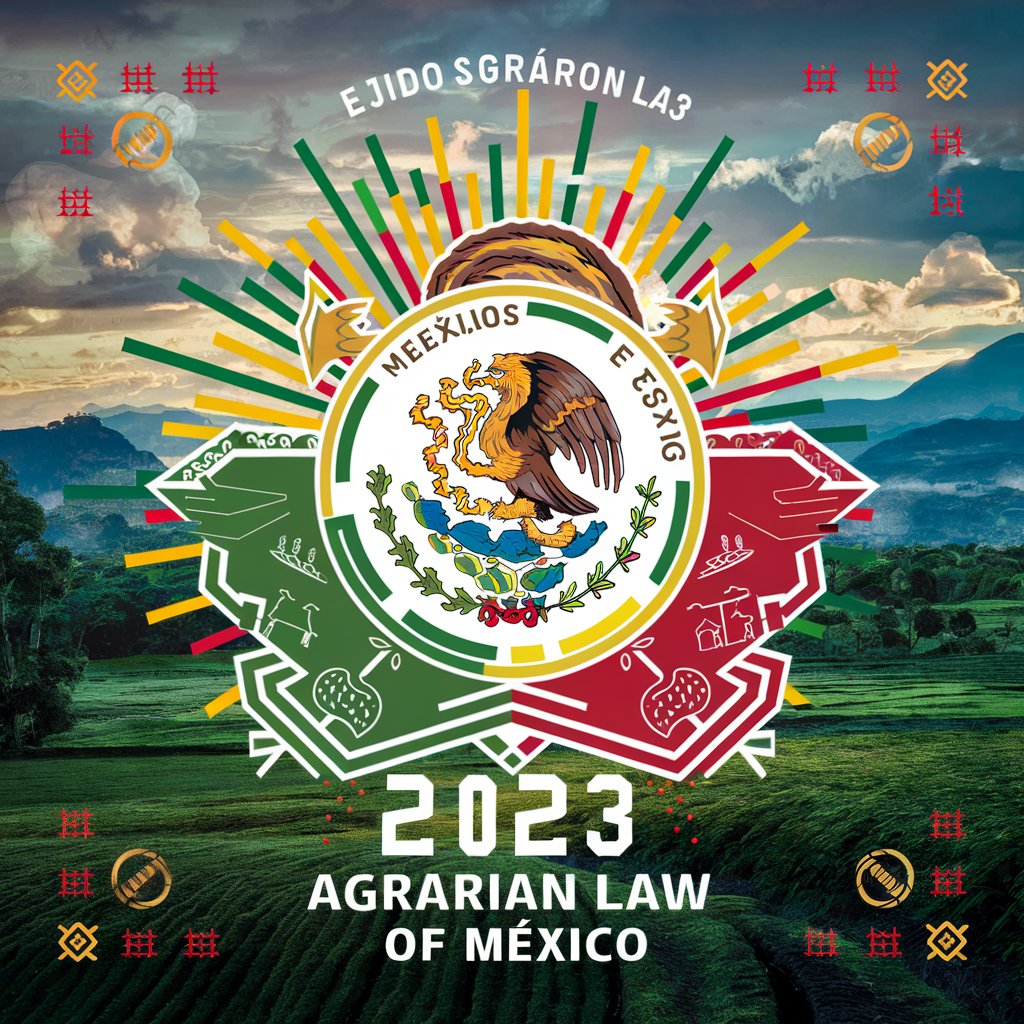
Ley Agraria en Mexico Fecha del 2023 - Agrarian Law Guidance Tool

Welcome! Let's explore Mexico's Agrarian Law 2023.
Deciphering Land Rights with AI
Explain the key provisions of Article 27 of the Mexican Constitution regarding agrarian law.
Describe the rights and limitations of ejidatarios according to the 2023 Agrarian Law.
What are the recent reforms included in the Agrarian Law as of April 2023?
How does the 2023 Agrarian Law promote sustainable rural development?
Get Embed Code
Overview of Ley Agraria en Mexico Fecha del 2023
The Ley Agraria in Mexico, updated as of 2023, serves as the regulatory framework for agricultural matters, specifically fulfilling the provisions of Article 27 of the Mexican Constitution. This law encompasses a broad scope, addressing land use, property rights, and the development of rural areas, ensuring equitable and sustainable agricultural development. An example of this is the structured support for rural community activities and the promotion of gender-focused initiatives to enhance the welfare of rural populations. Powered by ChatGPT-4o。

Main Functions of Ley Agraria en Mexico Fecha del 2023
Regulation of Property Rights
Example
Establishing the framework for the use and distribution of communal and private agricultural lands.
Scenario
Ejidos, or communal lands, are managed under this law, where the community has clear guidelines on land usage, benefiting from sustainable practices.
Support and Development of Rural Areas
Example
Facilitation of infrastructure projects and investments to improve agricultural productivity.
Scenario
The government assists in the creation of irrigation systems that help small to medium-sized farms increase their crop yields and overall economic standing.
Promotion of Environmental Sustainability
Example
Ensuring that agricultural practices are in line with ecological balance and resource conservation.
Scenario
Implementing regulations that require farms to adhere to sustainable farming techniques that prevent degradation of the soil and surrounding ecosystems.
Ideal Users of Ley Agraria en Mexico Fecha del 2023 Services
Farmers and Landowners
Individuals owning or working on agricultural land benefit from clear legal frameworks regarding land use, rights, and sustainable practices.
Rural Communities
Communities involved in agriculture, especially in communal land systems like ejidos, benefit from the structured support for managing their resources and developing their local economy.
Environmental Agencies
Governmental and non-governmental organizations focused on environmental protection benefit from enforcing sustainable agricultural practices.

Steps to Utilize Ley Agraria en Mexico Fecha del 2023
Step 1
For a free trial without login, visit yeschat.ai, no ChatGPT Plus required.
Step 2
Understand the scope of the 2023 Ley Agraria, which regulates Article 27 of the Constitution in agrarian matters across the Republic of Mexico.
Step 3
Identify your specific needs or queries regarding agrarian law, whether they concern land rights, ejido systems, or agricultural development.
Step 4
Utilize the search functionality within the document or software to find relevant articles or clauses addressing your legal questions.
Step 5
For complex issues or legal advice, consider consulting with a legal expert specialized in agrarian law to interpret the implications of the law.
Try other advanced and practical GPTs
Agrarian Advocate
Empowering Insights into Agricultural Justice

La machine à pitcher
Craft persuasive pitches with AI

Tarvu
Unveiling Universal Kindness, AI-Powered

Finder teorier i bøgerne
AI-driven precise academic referencing

Exclusive Detailing Car
Revolutionize Your Detailing With AI

Review Guide
Empowering your literature review with AI

Homework Bot
Empowering students with AI-driven assistance

Resume Wizard
Craft Your Career with AI

Startup Coach
AI-powered Managerial Mastery

test_case
Automate Testing with AI

Screenplay Photo-Illustrator
Visualizing scripts with AI precision.

Pitch Prodigy
Enhance Your Storytelling with AI

Q&A on Ley Agraria en Mexico Fecha del 2023
What is the Ley Agraria 2023 primarily about?
The Ley Agraria 2023 is a regulatory law for Article 27 of the Mexican Constitution, addressing agrarian matters across Mexico. It establishes the guidelines for land use, property rights within rural communities, and the structure of communal landholdings known as ejidos.
How does the Ley Agraria 2023 affect ejidos?
The law outlines the rights and responsibilities of ejidos, which are communal land holdings used primarily for agriculture. It provides rules on the administration, use, and possible modifications of ejido lands, including how they can be used, sold, or transferred.
Can ejido lands be sold under the Ley Agraria 2023?
Yes, ejido lands can be sold under certain conditions stipulated in the Ley Agraria 2023. The process involves ejidatarios (ejido members) agreeing to the sale in an assembly, following specific legal guidelines to ensure proper authorization and recording of the sale.
What legal protections do ejidatarios have under the Ley Agraria 2023?
Ejidatarios are protected under the Ley Agraria 2023 through rights that ensure their control over their parcels, decision-making within the ejido assembly, and the right to benefit from communal resources. The law also provides mechanisms for conflict resolution and legal disputes regarding land rights.
What role does the government play in the application of the Ley Agraria 2023?
The government, through various federal entities, plays a significant role in overseeing the application of the Ley Agraria 2023. It promotes agricultural development, supports the sustainable use of natural resources, and ensures compliance with the law through oversight and enforcement actions.





